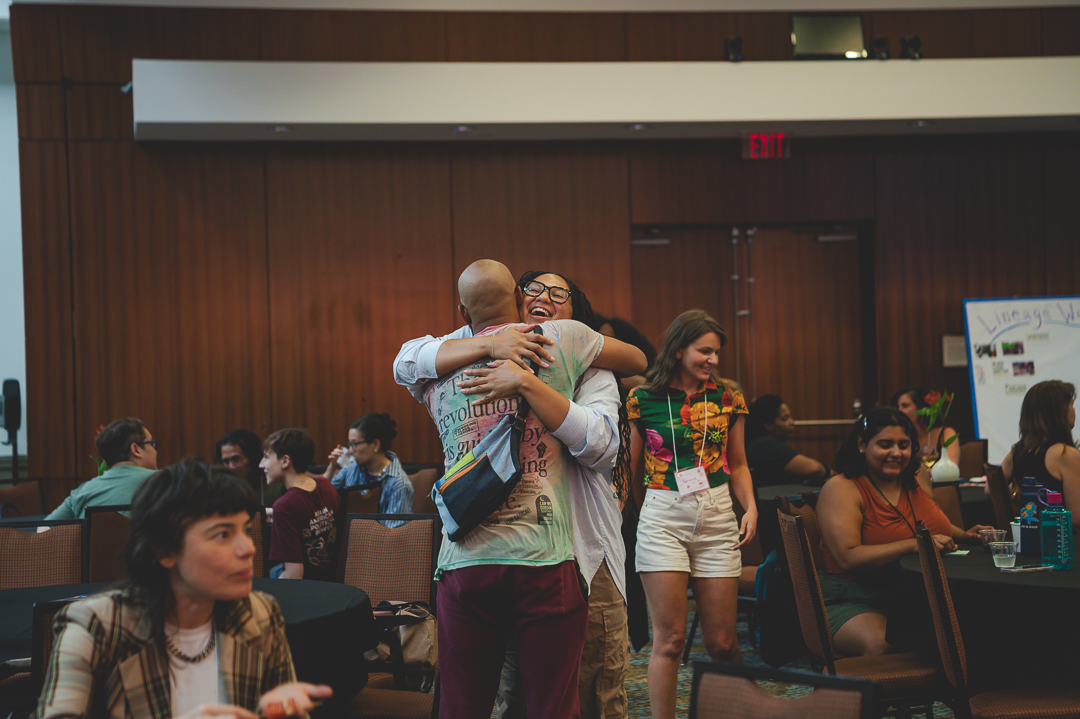In October 2024, ReFrame launched its first-ever Spanish-First training pilot, a two-part series creating a space for Spanish-speaking leaders and organizers to tackle harmful narratives, strengthen their storytelling, and reclaim their voices in a media and political landscape that often distorts them.
This work goes beyond tools and tactics– it's about power: who tells the story, whose voices are heard, and who decides how and which narratives take root? In a U.S. climate rife with xenophobia and disinformation, multilingual leadership is more urgent than ever.

Why Now? The Political Moment We’re In
In 2024, anti-immigrant and anti-Latine narratives surged, fueled by Trump’s election as President-elect. Political campaigns leaned on fear-driven messaging, blaming immigrants for economic instability, crime, and resource scarcity. Messages like, “they’re stealing our jobs,” or “they’re abusing public benefits” were weaponized by politicians and amplified by a media ecosystem that enriches itself from mis-and disinformation and prioritizes sensationalism.
These false and dangerous stories shape public opinion, justify oppressive policies, and dehumanize communities. For Spanish-speaking organizers, the stakes are even higher as they organize to build power, skill up and fight back.
As Ricardo Ortiz from Centro de los Derechos del Migrante (CDM) put it: “We’re tired of being talked about as a problem to solve. These trainings helped me see that we don’t have to wait for someone to give us permission to tell our story—we already have the tools to do it ourselves.”
What Is Spanish-First Narrative Power?
Narrative power shapes the stories that define what’s possible. Yet, Spanish-speaking communities in the U.S. are often excluded or misrepresented. Systemic barriers such as limited capacity, insufficient funding, and lack of multilingual leadership development have sidelined entire communities. The shortage of skilled multilingual narrative strategists keeps Spanish-speaking voices underrepresented and weakens their influence in seeding inclusive narratives across the narrative ecosystem.
ReFrame’s Spanish-First work attempts to address this gap. Built on a foundation of narrative work led by pioneering and emerging leaders across social justice movements, it is grounded in real-world experience and a deep understanding of narrative strategy and storytelling. This pilot was not born from assumptions or isolated efforts but as a response to the challenges identified by those at the forefront of narrative change work.
In 2022-2023 ReFrame collaborated with AfroResistance on Proyecto Oye, a listening and research initiative in Panama and Colombia. The research and report provides transformative insights into the untapped potential of narrative ecosystems across Latin America (LATAM). Led by afrodescendant and Latine grassroots leaders across the Americas, Proyecto Oye’s research zeroed in on LATAM narrative strategies, storytelling and tactics to counter disinformation. It revealed regional nuances in how “narrative” is understood as a concept, the dominance of Western frameworks, the weaponization of disinfo and the systemic erasure of Black Latine and afrodescendant narratives. The full report is available in English and Spanish.
Proyecto Oye demonstrated that culturally specific narrative work is not only a framework for resistance but also a pathway to liberation and reclaiming cultural identity. ReFrame’s Spanish-First work builds on this legacy, spanning borders, languages, and movements to create a continuum of narrative power that can transcend diasporas.
What Happened in the Trainings?
Participants from 17 organizations joined us across seven states, including California, New York, and Illinois. While each participant brought unique perspectives, they shared a common challenge: the need for narrative tools that reflect their language, culture, and lived experiences.
The pilot series included two core sessions:
- "Creando Poder Narrativo [Narrative Power 101]"
Participants learned to identify harmful narratives and craft counter-narratives rooted in their communities’ values. - "La Lucha Contra la Desinformación y la Misinformación [Combating Misinformation and Disinformation]"
This session focused on how mis- and disinformation undermines movements and provided tactics and tools to fight back.
Carlos Rodríguez from Parent Engagement Academy noted, “I’ve been to so many trainings that were just translations of English programs. This was different. It felt like it was designed with us in mind.”
What We Learned
Our learnings can be split into three major areas: the need for foundational content, the need for regional relevance, and the need for deep engagement.
- The Need for Foundational Content: Many participants wanted more entry-level sessions to build confidence in narrative work.
- Regional Relevance: Tailored examples and case studies that reflect specific regions would make the trainings even more impactful.
- Deep Engagement: Participants were deeply engaged, with parent leaders and youth organizers leading some of the most powerful conversations.
During a discussion about the stereotype of Latine people as “drains on public resources,” participants shared personal stories of how this narrative shows up in their work, from debates about healthcare access to school funding.
“These lies about us aren’t new,” shared Ana Torres from Mujeres Unidas. “But now I feel like I have a way to challenge them—not just in conversations, but in the stories I share with my community.”
Why This Work Matters
The pilot trainings mark the first phase of a broader Spanish-First leadership pipeline, establishing a network of narrative strategists poised to magnify our impact over the next decade. By expanding the curriculum and laying the groundwork for an expansive alumni network, this initiative strengthens a bench of skilled Spanish-first narrative practitioners. ReFrame’s ten years of work in communications and narrative make us primed to repurpose existing cornerstone programming, addressing a major gap in the field.
ReFrame believes that when multilingual communities are at the helm of creating and implementing strategy, they can shift narratives, challenge the status quo, and organize to transform entire systems long-term. ReFrame’s Spanish-First work aims to transform the whole narrative ecosystem, unlocking new possibilities and seeding influence and power in every voice — where every community matters.
The political and media landscapes will continue to challenge our communities, but one thing is for sure: our communities are ready to fight back.
If you’re inspired by this work and want to support or learn more, email Miguel Andrade at Miguel@thisisreframe.org.








































.jpeg)


.png)

%20(1).png)





























